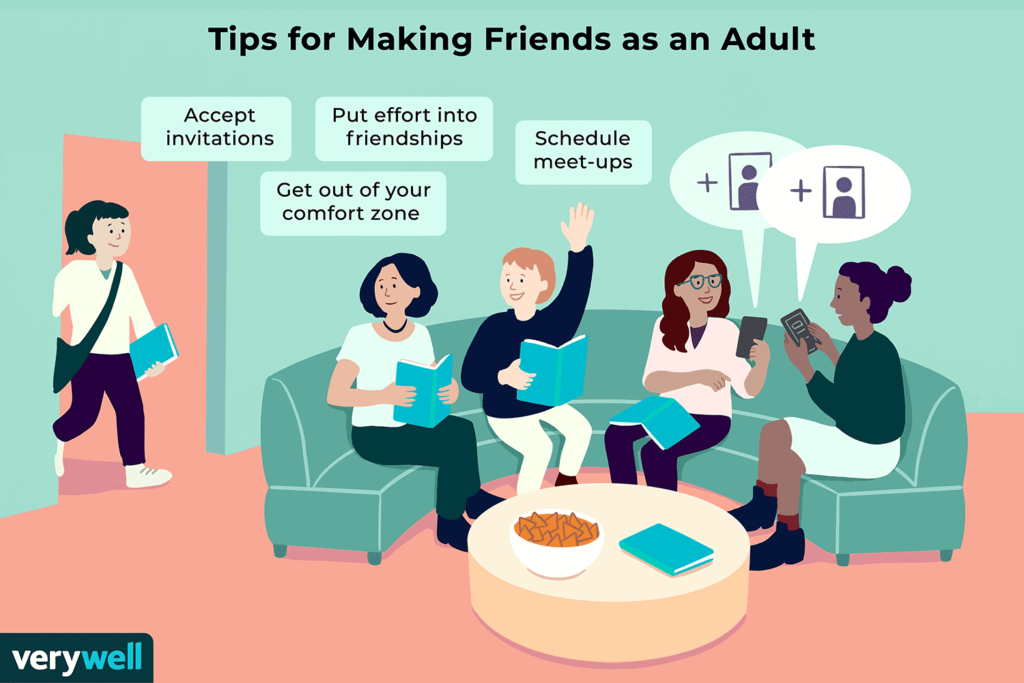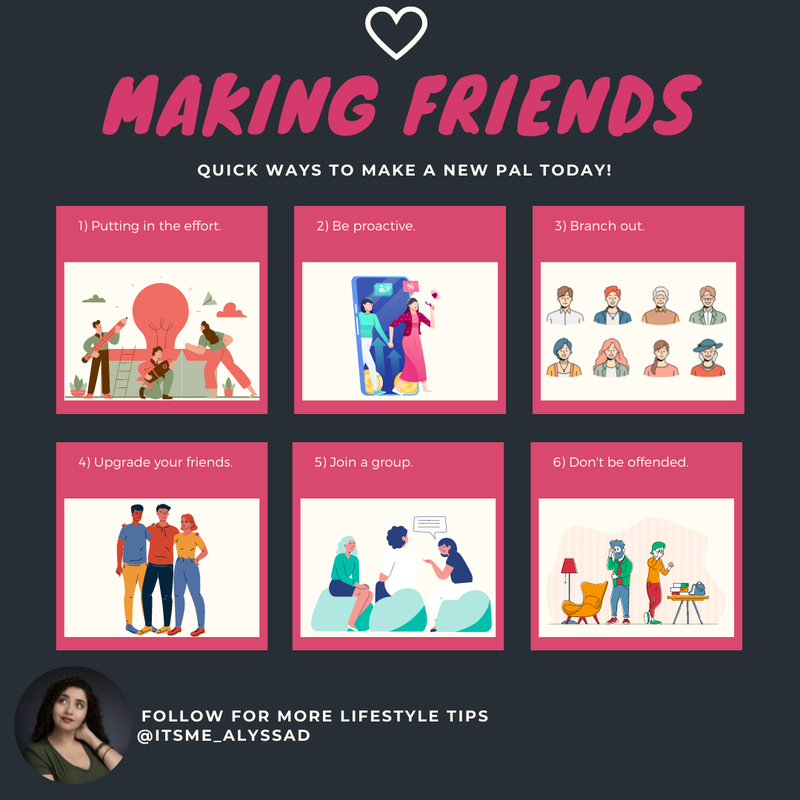
Have you ever found yourself longing for more meaningful connections in your adult life? Perhaps you’ve wondered where and how to make friends as an adult. Well, you’re not alone! Many individuals find it challenging to expand their social circles once they’ve reached adulthood. But fear not! In this article, we’ll delve into the world of adult friendships and explore some fantastic strategies to help you make new friends.
As an adult, you might be surprised to discover that the traditional ways of making friends have changed. It’s no longer as simple as walking up to someone on the playground and asking if they want to be friends. Instead, you need to actively seek out opportunities to connect with like-minded individuals. Don’t worry; it’s not as daunting as it may seem. From joining social clubs and hobby groups to attending community events and volunteering, there are countless avenues to explore. In the upcoming sections, we’ll dive deeper into these possibilities and provide you with valuable insights on how to make friends as an adult. So, buckle up, because you’re about to embark on an exciting journey towards expanding your social circle and building meaningful connections.
Table of Contents
How to Make Friends as an Adult

Introduction
As adults, making friends can sometimes feel like a daunting task. Gone are the days of easily forming bonds on the playground or in a college dorm. However, just because you’re no longer surrounded by potential friends doesn’t mean you can’t expand your social circle. In this article, we will explore various strategies and activities that can help you make friends as an adult. From joining clubs or organizations to networking through professional circles, there are plenty of opportunities to meet like-minded individuals and foster meaningful connections.
Finding Common Interests
Joining Clubs or Organizations
One effective way to make friends as an adult is to join clubs or organizations that align with your interests. Whether you’re passionate about photography, hiking, or cooking, there are likely local clubs or groups dedicated to these hobbies. By becoming a member, you’ll have the opportunity to meet others who share your passion and engage in activities together. Not only will this give you a chance to bond over a shared interest, but it also provides a comfortable and natural setting for conversations and interactions.
Attending Social Events
Attending social events is another great way to meet new people and potentially make friends. Look out for local gatherings, parties, or even networking events in your area. These events often attract a diverse crowd, making it easier to find individuals who share similar interests or goals. Be open to conversations, introduce yourself to others, and don’t be shy about asking questions. Remember, everyone is there to socialize and make connections, so take advantage of these opportunities!
Taking Classes or Workshops
Taking classes or workshops is not only a great way to learn something new but can also provide opportunities for building friendships. Whether it’s a language class, a fitness workshop, or an art lesson, signing up for structured activities allows you to meet people who have similar interests and goals. As you attend these classes regularly, you’ll have the chance to interact with your classmates, exchange ideas, and potentially form friendships outside of the class setting. Don’t be afraid to initiate conversations or suggest grabbing a coffee after class to continue the discussions.
Utilizing Online Platforms
Joining Social Networking Sites or Apps
In today’s digital age, social networking sites and apps have become popular platforms for making friends. Platforms like Facebook, Instagram, and Twitter allow you to connect with people all over the world. Look for groups or communities that align with your interests and join them. Engage in discussions, share your thoughts, and network with like-minded individuals. However, it’s important to remember to prioritize safety and exercise caution when interacting with strangers online. Always be mindful of sharing personal information and use these platforms as a starting point for building offline friendships.
Participating in Online Communities or Forums
Online communities and forums centered around specific interests or activities can also be great places to make friends. From gaming communities to book lover forums, there is a plethora of online spaces where you can connect with individuals who share your passions. Engage in discussions, ask questions, and provide valuable insights to establish yourself as an active member of the community. As you interact with others and get to know them better, you may find opportunities to take the friendships offline, such as organizing meetups or attending events together.
Engaging in Volunteering Activities
Joining Local Nonprofit Organizations
Volunteering not only allows you to contribute to a worthy cause but can also help you make friends with individuals who are equally passionate about making a difference. Research local nonprofit organizations that align with causes you care about and sign up to volunteer. Whether it’s helping at a homeless shelter, participating in environmental cleanup activities, or assisting at an animal shelter, you’ll have the opportunity to connect with like-minded individuals who share your values. Volunteering often involves teamwork, providing an excellent opportunity to bond with others and form meaningful friendships.
Participating in Community Service Projects
Community service projects are another avenue to meet new people and forge friendships. These initiatives are often organized by local communities or governmental bodies and focus on improving the neighborhood or addressing specific challenges. By volunteering your time and skills, you not only contribute to the betterment of your community but also engage with others who are invested in the same goals. Building relationships through shared experiences in service creates a strong foundation for long-lasting friendships.
Volunteering for Events or Causes
If you enjoy being part of large-scale events or causes, consider volunteering your time to assist in organizing them. Music festivals, charity runs, or even conventions typically require a team of volunteers. By joining these teams, you’ll work closely with others, sharing responsibilities and forming connections along the way. Whether it’s helping with logistics, ushering attendees, or managing the information booth, volunteering for events or causes allows you to meet individuals who are passionate about similar interests and create bonds that can extend beyond the event itself.

Networking Through Professional Circles
Attending Industry Conferences or Trade Shows
Attending industry conferences or trade shows not only keeps you updated on the latest trends but also provides an excellent opportunity to expand your professional network and make friends. Engage in conversations during panel discussions or breakout sessions, introduce yourself to fellow attendees during networking breaks, and exchange contact information with those you connect with. By nurturing connections within your industry, you not only increase your professional opportunities but also open doors to potential long-term friendships.
Joining Professional Associations or Groups
Joining professional associations or groups related to your field of work is another effective way to meet individuals with similar career interests and make friends. These associations often organize networking events, seminars, and workshops that provide valuable opportunities to connect with like-minded professionals. By actively participating in these activities and engaging in conversations with other members, you can expand your professional network while simultaneously building friendships within your industry.
Attending Networking Events or Meetups
Networking events and meetups cater to individuals looking to connect with others for both personal and professional reasons. These gatherings are designed specifically for networking and often feature ice-breaking activities or structured introductions. Don’t hesitate to attend these events alone – many others are in the same position, also seeking to meet new people. Be open, genuine, and curious about others’ stories, skills, and experiences. Remember, the goal is not just to exchange business cards but to form authentic connections that can develop into lasting friendships.
Making Friends at Work
Getting Involved in Company Activities or Teams
Making friends at work can greatly enhance your overall job satisfaction and work-life balance. Getting involved in company activities or joining teams can help foster social connections within the workplace. Whether it’s a company-sponsored sports team, a charity event, or a book club, participating in these activities allows you to interact with colleagues in a more relaxed and casual setting. By engaging with others outside the confines of work-related tasks, you can establish personal connections and encourage the development of friendships.
Organizing Office Outings or Lunches
Take the initiative to organize office outings or lunches. While it might seem daunting, suggesting a post-work happy hour or a team lunch can create opportunities to get to know your colleagues on a more personal level. Showing interest in coworkers’ lives beyond work can foster deeper connections and form the basis for more substantial friendships. Be open and inclusive, allowing everyone to contribute to the planning or suggest locations or activities that might interest them.
Attending Work-related Social Gatherings
Attending work-related social gatherings, such as holiday parties or team-building events, provides an opportunity to interact with colleagues in a more relaxed and social environment. Take advantage of these occasions to strike up conversations, learn more about your coworkers, and find common ground. By actively engaging in these events and showing genuine interest in others, you’ll increase the chances of forming meaningful relationships with your colleagues.

Exploring Shared Hobbies or Interests
Joining Sports Teams or Fitness Classes
Physical activities like joining a sports team or fitness class not only help you stay active but also provide an avenue for making friends with shared interests. Whether it’s joining a local soccer league, participating in a yoga class, or training for a marathon, these activities often involve teamwork and camaraderie. As you work towards common goals or challenge yourselves physically, you’ll have opportunities to connect with others, build trust, and form lasting friendships.
Participating in Art or Craft Workshops
Art or craft workshops are not only a great way to nurture your creativity but can also be a platform for meeting like-minded individuals. Whether it’s painting, pottery, or woodworking, signing up for these workshops allows you to connect with people who share your passion for the arts. Engage in conversations during classes, ask for feedback, and exchange techniques and ideas. Over time, these shared experiences and creative pursuits can create strong bonds and foster friendships.
Attending Book Clubs or Discussion Groups
Book clubs or discussion groups are fantastic opportunities to meet people who share your love for literature and intellectual discussions. Look out for local book clubs or join online platforms that facilitate virtual book discussions. By diving into captivating stories and sharing your thoughts with others, you can engage in meaningful conversations and build connections with individuals who appreciate literature as much as you do. Take the initiative to suggest meetups or gatherings to discuss books beyond the virtual space, further strengthening your friendships.
Building Connections in the Neighborhood
Attending Local Events or Festivals
Engaging in local events or festivals is an excellent way to connect with individuals who reside in your neighborhood. From food fairs to cultural festivals, these events often bring the community together and provide opportunities for interaction and connection. Strike up conversations with vendors, browse local booths, and attend performances or workshops. By actively participating in these events, you can meet new people, form connections based on shared geography, and potentially develop meaningful friendships.
Joining Neighborhood Associations or Committees
Neighborhood associations or committees are often formed to address community needs and foster a sense of belonging. By joining these groups, you can actively contribute to the betterment of your neighborhood while meeting fellow residents who share similar concerns and goals. Engage in committee meetings, brainstorm ideas, and participate in community improvement projects. These shared experiences and collaborative efforts can lead to the formation of lasting friendships with your neighbors.
Getting Involved in Community Projects
Volunteering for community projects is another way to engage with your neighbors and make friends. From park cleanups to charity fundraisers, community projects provide opportunities to meet individuals who are committed to making a positive impact in the neighborhood. By working side by side, you’ll have the chance to bond, share experiences, and create connections that extend beyond the project itself. Stay informed about ongoing initiatives and reach out to local organizations or community centers to get involved.

Taking Initiative and Being Proactive
Initiating Conversations and Invitations
Taking the initiative to start conversations and extend invitations is an important step in expanding your social circle. Be proactive in reaching out to coworkers, classmates, or acquaintances you’ve met through various activities. Invite them for a coffee, suggest a movie night, or organize a group outing to explore a new restaurant. By showing genuine interest and taking the lead in initiating activities, you demonstrate your willingness to invest in building connections and establishing friendships.
Hosting Social Gatherings at Home
Hosting social gatherings at your home provides an intimate setting to get to know others on a deeper level. Whether it’s a dinner party, a game night, or a barbecue, inviting friends, coworkers, or neighbors into your personal space allows for relaxed conversations and shared experiences. Creating a welcoming atmosphere and providing opportunities for meaningful interactions can help foster a sense of community and friendship. Don’t worry about hosting a perfect event – focus on creating a warm and inclusive environment where everyone feels comfortable and valued.
Organizing Group Activities or Outings
Organize group activities or outings centered around shared interests or common goals. Whether it’s organizing a hiking expedition, planning a trip to a museum, or suggesting a weekend getaway, taking the lead in organizing group activities provides opportunities for others to join in and foster new friendships. Clearly communicate the details, be open to suggestions, and ensure everyone feels included. By coordinating these outings, you not only create opportunities for friendship but also contribute to the social well-being of your community.
Maintaining and Strengthening Friendships
Regularly Keeping in Touch
Once you’ve formed friendships, it’s important to regularly keep in touch with your friends. Whether it’s through phone calls, text messages, or social media, make an effort to reach out and show genuine interest in their lives. Celebrate their successes, offer support during challenging times, and be present in their lives. By nurturing these friendships, you ensure that they remain strong and continue to bring joy and fulfillment into your life.
Planning and Scheduling Meetups
In addition to regular communication, planning and scheduling meetups with your friends is vital to maintaining and strengthening your friendships. Life can get busy, but making the effort to set aside time for in-person interactions is crucial. Plan brunches, movie nights, or even short weekend trips. By actively prioritizing these activities, you demonstrate the value you place on your friendships. Remember, consistency and quality time spent together are key ingredients in building and deepening lasting friendships.
Supporting and Being There for Friends
Finally, as a friend, it’s important to be supportive and present for each other. Celebrate milestones, offer a listening ear during difficult times, and provide a shoulder to lean on when needed. Show empathy, practice active listening, and offer guidance or encouragement when appropriate. By being a reliable and compassionate friend, you build trust and foster deeper connections with those you cherish.

Conclusion
Friends play a crucial role in our lives, providing support, joy, and a sense of belonging. While making friends as an adult may seem challenging, there are numerous opportunities and strategies to expand your social circle. From joining clubs or organizations to networking through professional circles, exploring shared hobbies or interests, and participating in volunteering activities or community projects – the possibilities are endless. Remember to take initiative, be proactive, and prioritize nurturing and strengthening your friendships. By following these steps, you can cultivate meaningful connections and enjoy the benefits of having a supportive and fulfilling social circle in your adult life.

